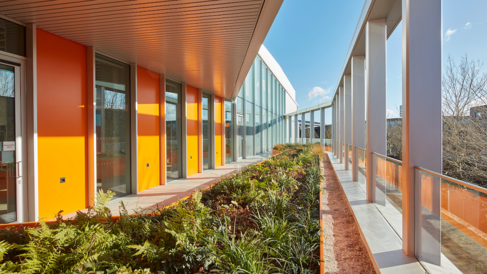Reshaping our Estate Programme

Reshaping our Estate is a collaborative, strategic programme, with a clear objective to create a more fit-for-purpose estate that is effective, efficient, and sustainable, that better supports the University’s academic mission.
The programme spent a couple of years engaging with the University Community to better understand how space is used and present opportunities to use space more efficiently, creating an estate that is fit for the 21st century and able to support world-leading research and education. This work has led to the development of the Strategic Estate Framework (cam-only) and Strategic Capital Plan.
Reshaping our Estate Principles
The Reshaping our Estate Principles serve as an underpinning design guide for the University estate. The estate covers not just buildings; it relates to the whole University environment and how it interacts with the wider City of Cambridge.
1. Create high quality spaces that support staff and students to do their best work
Our estate should create a positive and productive working and learning environment for our staff and students and support excellence in teaching and research, and our public-facing activities.
2. Develop a smaller estate with more shared spaces
We should reduce the size of our estate and encourage space sharing to make better use of our existing spaces, avoid unnecessary costs and reduce our carbon footprint. We should consider opportunities to monetise parts of our estate which are not needed for teaching, research, public-facing or professional services space.
3. Consider how to make the most of existing spaces before building new ones
Wherever possible, we should meet our space needs using existing buildings rather than building new ones where financially and environmentally sound. This will help us to manage our estate in a more affordable way, while minimising the environmental costs of construction. We should make sure that new buildings meet recognised sustainable building standards, and that any development of our estate delivers a net gain in biodiversity.
4. Support teams across the University to adopt new ways of working
Our physical estate should enable the University to adopt flexible working practices and allow staff to work in spaces that support their style and meet their needs.
5. Develop a financially and environmentally sustainable estate
We should be seeking all opportunities to reduce carbon emissions in our estate as part of the University’s aspirations for a zero-carbon future. We should look for opportunities to mitigate the environmental costs of managing our estate, for example by introducing more environmentally sustainable practices with regards to energy use or waste management. The operation of our estate must be financially sustainable, and there must be full transparency on how much it costs to manage our estate.
6. Protect and promote our built and cultural heritage
Our estates strategy should protect our architectural and cultural heritage and develop high quality public spaces for staff, students, residents and visitors to enjoy.
Contact
Contact the Reshaping our Estate Programme team at: ReshapingourEstate@admin.cam.ac.uk. Follow Reshaping our Estate on Viva Engage to find the latest programme updates.
